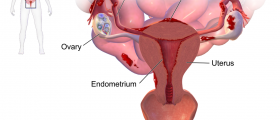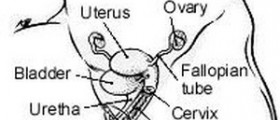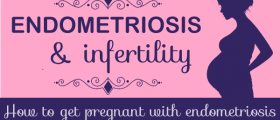
Endometriosis is a rather serious medical condition affecting women only. The cells that normally line the uterus are in women suffering from the condition found in other organs of the pelvis. Apart from being present in other locations except from the uterus, these cells react to hormonal stimulation which is the major problem of endometriosis. The presence of these cells in other organs is associated with pain, bleeding and may also affect a woman's ability to conceive.Endometriosis Causes and Risk Factors
Scientist are still unable to reveal a mystery regarding how cells from the uterus reach other organs in the pelvis. There are several different theories none of which have been completely accepted. According to one theory endometrial cells released during monthly bleeding return back through the fallopian tubes and enter the pelvis. From there they easily attach to different pelvic organs.
Endometriosis is reported to run in some families. It is most commonly diagnosed in women between 25 and 35 years of age but it actually starts the moment regular menstruation begins.
Risk factors for endometriosis are the onset of menstruation at an early age, frequent menstrual cycles and periods that last 7 or even more days. Additionally, women who have never had children are more susceptible to the condition.
Endometriosis Treatment Options
Treatment for endometriosis is conservative or surgical. Even the combination of the two is possible.
Pain medications are administered in almost all women suffering from the condition. These drugs are taken during menstrual bleeding when cramps can be unbearable.
Hormone TherapyHormone therapy regulates a woman's cycle not allowing some hormones to reach their peak and induce all the unpleasant symptoms.Hormonal contraceptives such as birth control pills, patches and vaginal rings control hormones that may induce build-up of endometrial tissue. This therapy can also alleviate pain associated with endometriosis.
Gonadotropin-releasing hormone (Gn-RH) agonists and antagonists control female hormones by blocking the production of ovarian-stimulating hormones. These drugs are highly efficient and may provide with long-term remission.
Danazol prevents synthesis of ovarian-stimulating hormones and suppresses the growth of the endometrium. It is not frequently prescribed because of side effects such as acne and facial hair growth.
Finally, some patients are prescribed Medroxyprogesterone or aromatase inhibitors.
Surgery for EndometriosisCertain number of patients undergo conservative surgery and only if endometriosis is severe, women may need to undergo complete surgical removal of the uterus called hysterectomy.Conservative surgery deals with endometrial implants and removes endometrial growths as well as scar tissue that has developed due to repeated bleeding and associated inflammation. This type of surgery is performed laparoscopically. Hysterectomy is, on the other hand performed as an open surgery and represents the last resort for women suffering from severe forms of endometriosis.

















Your thoughts on this
Loading...